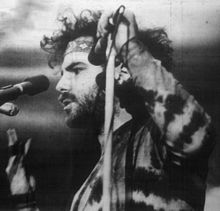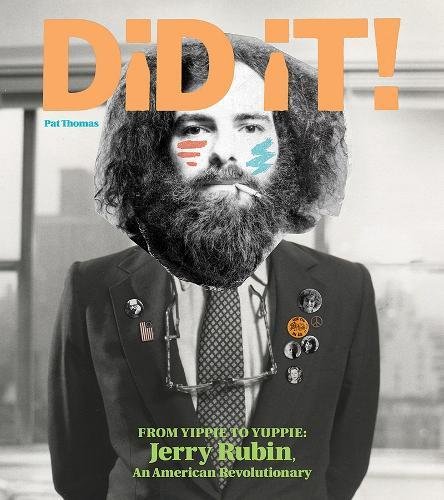Background
Jerry Rubin was born in Cincinnati, Ohio, United States, on July 14, 1938.



( This is the first art book and biography of Yippie Jerr...)
This is the first art book and biography of Yippie Jerry Rubin. The author of Listen, Whitey! The sights & sounds of Black Power 1965-1975 now chronicles the 1960's and '70's through they eyes of Yippie Jerry Rubin Did It! From Yippie to Yuppie: Jerry Rubin, an American Revolutionary is an oversized oral & visual history of the infamous and ubiquitous Rubin the first ever biography of the co-founder of the Yippies, Anti-Vietnam War radical, Chicago 8 defendant, New Age/Self Help proponent, and social-networking pioneer. After a surfeit of books about Abbie Hoffman, heres the first ever biography of his Yippie running mate Jerry Rubin! Based upon over 75 original interviews with his co-conspirators, friends and foes, this book not only explores the life and times of Rubin, but the generation that consisted of idealistic firebrands in the 1960s, segued into the Me generation in the 1970s, and became full blown capitalists engaged in the 1980s. Those interviewed include fellow Chicago 8 Defendants, participants in the Berkeley Free Speech Movement; Paul Krassner, Judy Gumbo, Nancy Kurshan, John & Leni Sinclair, Bobby Seale, Rennie Davis, Lee Weiner, Country Joe McDonald and dozens more reveal, in their own words, vibrant stories of the era. Often left out in histories of the radical sixties, twenty women speak out in their own voice! Also chronicled is the 1970s New Age Movement with commentary from Stella Resnick, Werner Erhard, Mimi Leonard and others. Bizarre interactions with luminaries including Allen Ginsberg, Bob Dylan, Timothy Leary, and John Lennon are described via interviews and diaries (found in Rubins personal archives and published here for the first time) along with photographs and correspondence with Norman Mailer, Eldridge Cleaver, Mayor Daley and the Weathermen. Also explored is the oft-misunderstood relationship between Rubin and his partner-in-crime Abbie Hoffman with controversial insights into their Yippie vs. Yuppie debates. Full-color illustrations throughout.
http://www.amazon.com/gp/product/1606998927/?tag=2022091-20
activist Businessman lecturer writer
Jerry Rubin was born in Cincinnati, Ohio, United States, on July 14, 1938.
He was educated at the University of Cincinnati (B. A. , 1961), Hebrew University, and the University of California at Berkeley.
A journalist during his student years, Rubin became a full-time agitator in response to the Vietnam War. He was an organizer of Berkeley's Vietnam Day Committee (VDC) in 1965 which held the world's largest teach-in against the war. During a march on the Oakland Army Terminal, the VDC was attacked by both police and Hell's Angels (outlaw bikers who were extreme patriots and regarded the anti-war movement as a "mob of traitors").
In 1967, with Abbie Hoffman, he founded the Youth International Party. The party mixed political activism and the unbuttoned bohemianism of the period. He was advised to rely upon his First Amendment right of free speech but explained that was not enough as the movement had to be "as exciting as the Mets. " In that spirit Rubin attended the hearings dressed as a Revolutionary War soldier, subsequently appearing before committees as a bare-chested guerrilla and as Santa Claus.
In 1967 he was made project director of a flagging effort to demonstrate against the military in Washington. What resulted was the celebrated March on the Pentagon, when some 75, 000 protesters including Mailer, the poet Robert Lowell, critic Dwight Macdonald, Dr. Spock, Noam Chomsky, and many others rallied and railed against the war.
In 1968 Rubin and Hoffman, in connection with various peace groups, led what proved to be a far more violent anti-war protest. They planned to hold a yippie "Festival of Life" in Chicago during the Democratic National Convention. Crying out that "the streets belong to the people, " yippie demonstrators made the streets unusable by setting fires, building barricades, and carrying out other acts of vandalism. This inspired the police (whom Rubin called "Czechago pigs") to beat and arrest them. It was a source of particular satisfaction to Rubin that bystanders and members of the press also fell victim to police enthusiasm. Whether the resulting publicity did the anti-war movement more harm than good is debatable.
But Chicago authorities, led by the peerless Mayor Richard Daley, were not content with what they had accomplished, and Rubin and six others (including Hoffman and Tom Hayden of the Students for a Democratic Society), who came to be called the "Chicago Seven, " plus Bobby Seale of the Black Panthers were tried for conspiracy to incite riot. The trial was scandalous in the extreme. The defendants vilified Judge Julius Hoffman, who at one point had Seale bound and gagged, finally separating his case from the others. Ultimately all eight-plus their lawyers-were found to be in contempt of court. Though convicted on lesser counts by a jury, none of the defendants went to jail as the trial had been a farce and the verdicts did not stand up on appeal.
Like most movement activists Rubin was "forcibly retired, " as one interviewer put it, in the 1970.
He took up a new career as a stockbroker in 1980 with the brokerage firm of John Muir & Co. Rubin continued his capitalistic pursuit with the creation of Business Networking Salons, Inc. , a business in which Rubin and his wife, Mimi, would host weekly "parties" at New York's Studio 54 for the business crowd. In 1992 Rubin, living in California, joined a multilevel sales company called Omnitrition International, which sold powdered drink mixes. This company and Rubin were hit in 1992 with a class action suit claiming the company was involved with an illegal pyramid scheme.
In November, 1994, Rubin was hit by a car while jaywalking in Hollywood. He died 14 days later in a UCLA hospital bed.
He was best known as a leader of the counter-culture in the 1960. In the mid-70s Rubin reinvented himself as a businessman. He became known for his promotion of business networking, having created Business Networking Salons, Inc. , a company that organized parties at the Studio 54 and Palladium nightclubs in Manhattan. Rubin was heavily involved in multi-level marketing of health foods and nutritional supplements. His business activities included marketing of a nutritional drink named Wow! that contained bee pollen, ginseng and kelp
( This is the first art book and biography of Yippie Jerr...)
(Vintage Books)
He discovered that capitalism was nicer than he had previously supposed.
His followers were the "yippies, " as they were known. He believed in the necessity of staging theatrical events and stunts that were intended to discredit authority and by means of cultural insurgency to bring on the social revolution. In the result they failed in this, but succeeded in reaping a harvest of publicity that maddened and enraged the power structure. Rubin did much to further this process when he was called before the House Committee on Un-American Activities to explain his subversive ways.
Quotations:
Jerry Rubin remarked in 1970 (After the Vietnam War politicized marijuana):
"Smoking pot makes you a criminal and a revolutionary. As soon as you take your first puff, you are an enemy of society. "
Rubin showed himself to be a master organizer and publicist capable of transforming conventional protests into media happenings.
Among the cults and techniques he sampled were EST, Esalen, meditation, massage, acupuncture, hypnotism, health foods, tantric yoga, and rolfing.
Never an intellectual, Rubin gave up reading anything that did not concern self-help.
Quotes from others about the person
The novelist Norman Mailer later wrote that, "to call on Rubin was in effect to call upon the most militant, unpredictable, creative-therefore dangerous-hippie-oriented leader available to the New Left. "
In a biography printed in the Los Angeles Times after Rubin's death, fellow Chicago Seven member and friend Tom Hayden stated: "Rubin was a great life force, full of spunk, courage, and wit. I think his willingness to defy authority for constructive purposes will be missed. Up to the end, he was defying authority. "
State Senator (D-Santa Monica), fellow Chicago Seven member and friend Tom Hayden said after Rubin's death:
"He was a great life force, full of spunk, courage and wit. I think his willingness to defy authority for constructive purposes will be missed. Up to the end, he was defying authority. "
He married Mimi Leonard. They had 2 children.
